You are here
New Releases
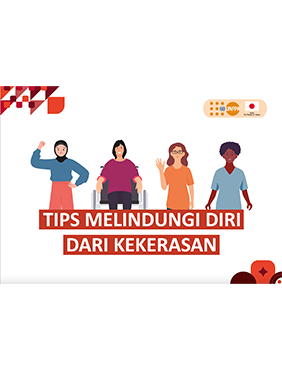
Tips Melindungi Diri dari Kekerasan, Ruang Ramah Perempuan: Ruang Aman di Lokasi Pengungsian, Hal yang Perlu Diketahui tentang COVID-19, Bantuan Sosial untuk Penyandang Disabilitas
Tips Melindungi Diri dari Kekerasan, Ruang Ramah Perempuan: Ruang Aman di Lokasi Pengungsian, Hal yang Perlu Diketahui tentang COVID-19, Bantuan Sosial untuk Penyandang Disabilitas.
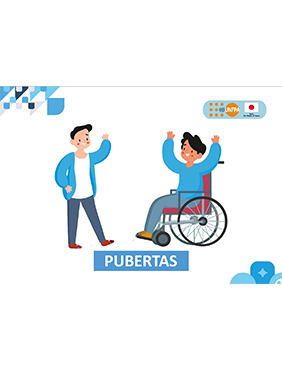
Pubertas, Hal yang Perlu Diketahui Tentang COVID-19, Bantuan Sosial untuk Penyandang Disabilitas
Pubertas, Hal yang Perlu Diketahui Tentang COVID-19, Bantuan Sosial untuk Penyandang Disabilitas
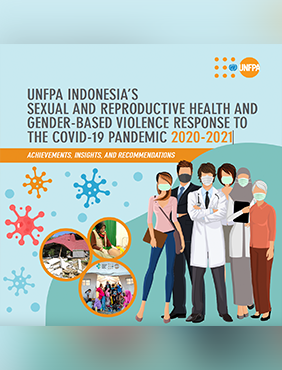
UNFPA INDONESIA’S SEXUAL AND REPRODUCTIVE HEALTH AND GENDER-BASED VIOLENCE RESPONSE TO THE COVID-19 PANDEMIC 2020-2021
In the early months of 2020, the world was starting to learn about the coronavirus disease (COVID-19), a newly discovered and highly contagious strain of the coronavirus. Its seemingly abrupt emergence as well as its staggering ability to spread, quickly upended the world’s collective sense of normalcy and pushed nations to implement significant changes to even the most mundane activities. In Indonesia, the first official case of COVID-19 was recorded on March 2, 2020. At present (July 2021), Indonesia is experiencing its most significant spike in confirmed cases to date, placing it as the “new epicenter of the pandemic.” In total, WHO has reported over 3 million COVID-19 cases and 80 thousand deaths in the country (per July 23, 2021).
In response to the vast reach and growing threat of COVID-19, UNFPA formulated a global response plan during the earlier months of the pandemic to address the disproportionate toll of COVID-19 on marginalized groups, particularly women and girls. At the country level, UNFPA Indonesia developed a Sexual and Reproductive Health (SRH) and Gender-based Violence (GBV) response in support of the Government of Indonesia (GoI) and its efforts to address the various impacts of the COVID-19 pandemic. UNFPA Indonesia’s SRH and GBV Response Plan was developed in line with the UNFPA Global Response Plan, and in support of the UN Indonesia Multi-Sector and Socio-Economic Response Plans and their priority areas.
UNFPA Indonesia’s SRH and GBV Response Plan received additional funding from the Australian Government Department of Foreign Affairs and Trade (DFAT Australia), Global Affairs Canada (GAC), and the United Nations Entity for Gender Equality and Empowerment (UN Women), which enabled the response to widen its reach and deepen its impact in COVID-19 affected areas. This response plan was implemented in partnership with government and professional agencies, civil society organizations, and academic institutions (listed in the table below). Furthermore, program implementation in the field was supported by local government agencies and organizations.
The achievements described in this report focus on the SRH and GBV initiatives that were conducted between June 2020 and June 2021. With full consideration of the on-going COVID-19 pandemic and the various limitations it presents, all activities under this response were formulated and adjusted to ensure the safe continuity of SRH services and the effective management/prevention of GBV in Indonesia. In this regard, UNFPA Indonesia, in collaboration with its implementing partners, has made significant strides towards these goals through the following activities:
- Distribution of personal protective equipment PPE, maternity kits, and dignity kits (to protect service providers and their patients/clients).
- Continuation of service provider training through online platforms (to improve service delivery).
- Dissemination of information through online platforms (to raise public knowledge and awareness).
- Community engagement in humanitarian settings (offline engagement following COVID-19 protocols).
- Documentation for future reference and sustainability.
Reflections from UNFPA’s implementing partners have been compiled, summarized, and categorized under the following thematic categories: 1) distribution of essential equipment in disaster and non-disaster areas; 2) making the shift from offline to online platforms; 3) ensuring clear lines of communication and strong coordination; and 4) encouraging innovation in service delivery. Similarly, the recommendations in this report correspond specifically to the implementation of SRH and GBV activities under the current COVID-19 pandemic. In doing so, these recommendations illustrate clear and practical considerations that can be used to improve the development of future programs in a pandemic situation.
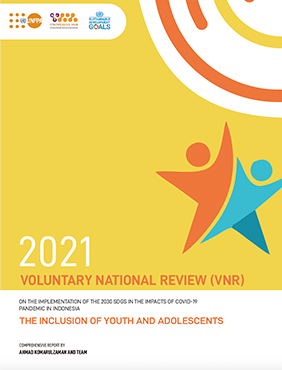
2021 Voluntary National Review (VNR): THE INCLUSION OF YOUTH AND ADOLESCENTS
2021 Voluntary National Review (VNR):
On the Implementation of the 2030 SDGs in the Impacts of COVID-19 Pandemic in Indonesia
The Inclusion of Youth and Adolescents
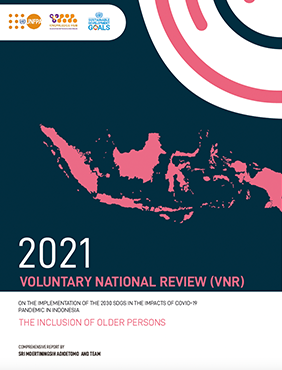
2021 VOLUNTARY NATIONAL REVIEW (VNR): THE INCLUSION OF OLDER PERSONS
2021 VOLUNTARY NATIONAL REVIEW (VNR):
On the Implementation of the 2030 SDGs in the Impacts of COVID-19 Pandemic in Indonesia
The Inclusion of Older Persons

2021 Voluntary National Review (VNR): THE INCLUSION OF PEOPLE WITH DISABILITIES
2021 Voluntary National Review (VNR):
On the Implementation of the 2030 SDGs in the Impacts of COVID-19 Pandemic in Indonesia
The Inclusion of People with Disabilities
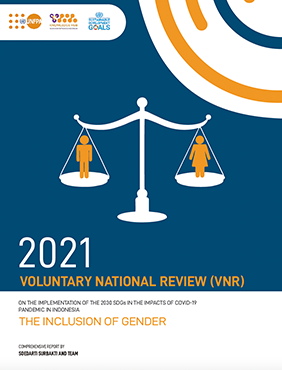
2021 Voluntary National Review (VNR): THE INCLUSION OF GENDER
2021 VOLUNTARY NATIONAL REVIEW (VNR):
On the Implementation of the 2030 SDGs in the Impacts of COVID-19 Pandemic in Indonesia
The Inclusion of Gender
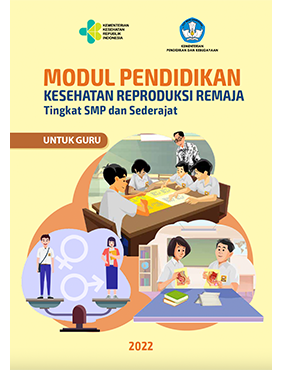
Modul Pendidikan Kesehatan Reproduksi Remaja Tingkat SMP dan Sederajat
Kementerian Pendidikan, Kebudayaan, Riset, dan Teknologi dan Kementerian Kesehatan, dengan dukungan UNFPA melakukan pemetaan materi dan menyusun modul pendidikan kesehatan reproduksi untuk remaja jenjang pendidikan dasar SMP atau yang sederajat. Modul ini ditujukan khususnya bagi guru untuk dapat digunakan sebagai salah satu sumber informasi yang akurat dan komprehensif terkait kesehatan reproduksi remaja.
Muatan kesehatan reproduksi remaja pada modul ini dapat diintegrasikan dalam pembelajaran IPA (Biologi) dan Pendidikan Jasmani Olah Raga dan Kesehatan (PJOK) secara kolaboratif-integratif dalam sebuah projek atau bentuk penugasan lain. Modul ini juga dapat dimanfaatkan bagi guru Bimbingan dan Konseling (BK) dalam mendampingi dan mengarahkan tumbuh-kembang anak atau peserta didik.
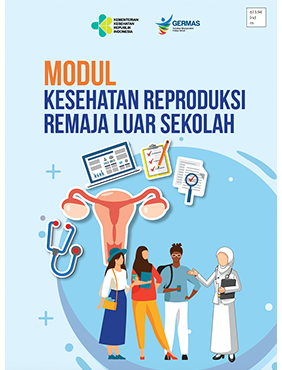
Modul Pendidikan Kesehatan Reproduksi Remaja Luar Sekolah
Kementerian Kesehatan dan UNFPA melakukan pemetaan materi dan menyusun modul pendidikan kesehatan reproduksi untuk remaja yang dapat diberikan di luar sekolah. Modul ini dapat menjadi pegangan bagi petugas kesehatan dan pembina remaja dalam menyampaikan informasi dan meningkatkan kapasitas remaja mengenai kesehatan reproduksi remaja di berbagai forum seperti posyandu remaja, pembinaan di Panti/ Lembaga Kesejahteraan Sosial Anak (LKSA), Lembaga Pembinaan Khusus Anak (LPKA), komunitas remaja dan konteks lainnya di luar sekolah/ gedunMateri dalam modul Kesehatan Reproduksi Remaja ini mencakup 7 bagian yang membahas isu kesehatan reproduksi secara komprehensif dan terdiri dari (1) Nilai, Konsep diri dan Batasan Diri, (2) Hubungan dengan orang lain, (3) Pertumbuhan dan Perkambangan Remaja, (4) Masalah Kesehatan Reproduksi, (5) Gender dan Pencegahan Kekerasan, (6) Peran Teknologi Informasi dan Komunikasi dalam Pendidikan Kesehatan Reproduksi, dan (7) Dukungan dan Layanan. Modul ini juga dilengkapi dengan berbagai jenis permainan sebagai metode penyampaian materi untuk meningkatkan partisipasi, pemahaman dan keterampilan remaja mengenai kesehatan reproduksi remaja.
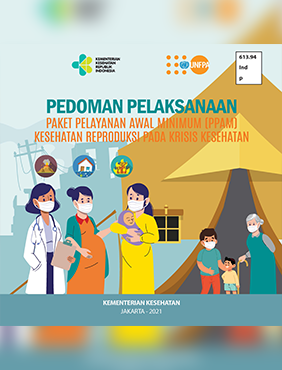
Operational Guideline on Minimum Initial Service Package for Reproductive Health
Indonesia, due to its geographical areas, faces high risks of natural disasters that adversely affect reproductive health services, particularly for women and girls. The Minimum Initial Service Package (MISP) addresses these challenges by providing integrated sexual and reproductive health services in crisis situations. This guideline, developed in 2014 and updated in 2018, ensures the adaptability to Indonesia's context.